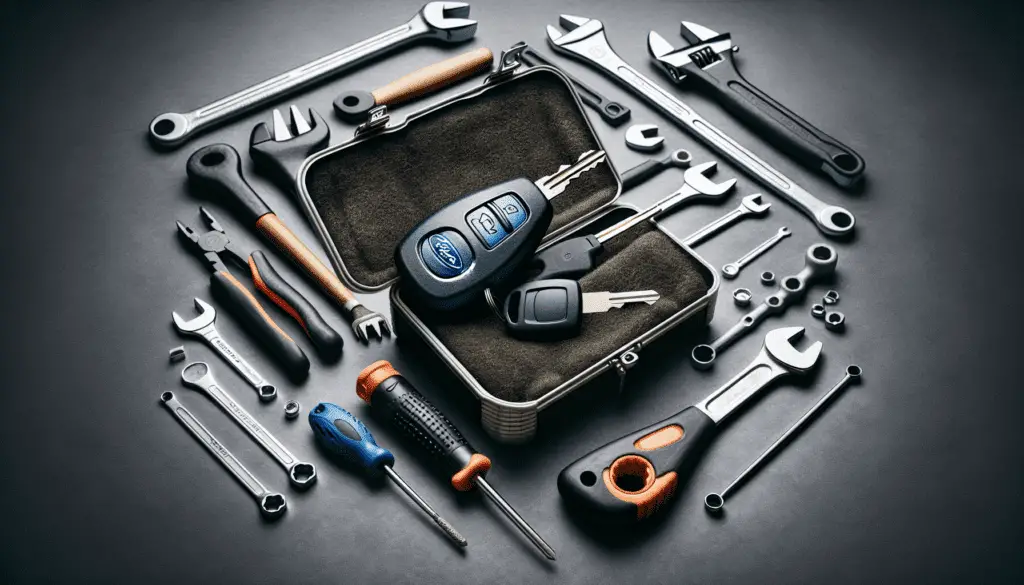Hey there! If you’re a proud owner of a Ford vehicle, you’ll want to stick around. In this article, we’ll be discussing the most frequent problems faced by Ford owners and how to solve them. From pesky engine issues to electrical glitches, we’ve got you covered. So, get ready to become a pro at fixing common Ford vehicle problems. Let’s jump right in!

Engine Problems
Overheating
One of the most common engine problems that Ford vehicles face is overheating. This occurs when the engine gets too hot and can lead to serious damage if not addressed promptly. The causes of overheating can vary, but some common culprits include a malfunctioning thermostat, a failing radiator, or low coolant levels. If your engine is overheating, it is essential to address the issue as soon as possible to prevent any further damage.
To fix the overheating problem, you can start by checking the coolant levels and topping it up if necessary. Additionally, you should inspect the radiator for any leaks or clogs and have it repaired or replaced if needed. The thermostat should also be inspected and replaced if it is faulty. If you are unsure about how to handle these repairs, it is best to consult a professional mechanic who specializes in Ford vehicles.
Misfires
Another common engine problem that you may encounter in your Ford vehicle is misfires. Misfires occur when the engine cylinders fail to ignite the fuel-air mixture correctly, leading to a loss of power and rough running. This issue can be caused by a variety of factors, such as a faulty spark plug, a malfunctioning fuel injector, or an issue with the ignition system.
To address misfires, you can start by checking the spark plugs and replacing them if they are worn out or damaged. It is also recommended to examine the fuel injectors and clean or replace them if necessary. Additionally, a thorough inspection of the ignition system, including the coils and wires, can help identify any issues. If you are unsure about how to proceed, it is advisable to seek assistance from a qualified mechanic.
Stalling
Stalling is another engine problem that Ford vehicle owners may encounter from time to time. This can be incredibly frustrating and potentially dangerous, especially if it occurs while you are driving. Stalling can have various causes, including a malfunctioning fuel pump, a clogged fuel filter, or an issue with the engine control module.
To fix the stalling issue, it is recommended to start by checking the fuel system components, such as the fuel pump and filter, and replacing them if necessary. Additionally, a thorough inspection of the engine control module can help identify any malfunctions and allow for proper repairs. If you are unsure about how to address this problem, it is advisable to consult with a professional mechanic who has experience in working with Ford vehicles. They will be able to diagnose the issue accurately and provide the appropriate solution.
Transmission Problems
Slipping gears
Slipping gears is a common transmission problem that Ford vehicle owners may encounter. This occurs when the transmission fails to stay in the desired gear, resulting in a loss of power and erratic shifting. Slipping gears can be caused by a variety of factors, such as worn-out clutches, low transmission fluid levels, or a faulty torque converter.
To fix slipping gears, it is recommended to start by checking the transmission fluid levels and topping it up if necessary. If the fluid is dark or has a burnt smell, it may need to be flushed and replaced. Additionally, inspecting the clutches and replacing them if they are worn out can help resolve the issue. In more severe cases, the torque converter may need to be repaired or replaced. If you are unsure about how to proceed with these repairs, it is best to consult with a qualified transmission specialist.
Delayed engagement
Another transmission problem that Ford vehicle owners may face is delayed engagement. This occurs when there is a delay in the transmission engaging into gear, causing a significant delay in movement when shifting from park to drive or reverse. Delayed engagement can be caused by a variety of factors, including low transmission fluid levels, a faulty shift solenoid, or a worn-out transmission pump.
To address delayed engagement, it is recommended to start by checking the transmission fluid levels and topping it up if necessary. If the fluid is low, there may be a leak that needs to be identified and repaired. Additionally, inspecting the shift solenoid and replacing it if faulty can help resolve the issue. In more severe cases, the transmission pump may need to be repaired or replaced. It is advisable to consult with a professional transmission specialist for proper diagnosis and repairs.
Transmission fluid leaks
Transmission fluid leaks are another common transmission problem that Ford vehicle owners may encounter. These leaks can occur due to various reasons, such as a faulty seal, a cracked transmission case, or loose transmission cooler lines. Transmission fluid leaks can lead to serious damage if left unaddressed, as low fluid levels can cause the transmission to overheat and fail.
To fix transmission fluid leaks, it is recommended to start by identifying the source of the leak. This may require inspecting the transmission case, seals, and cooler lines. Once the source of the leak is identified, the necessary repairs or replacements can be made. It is important to address transmission fluid leaks promptly to prevent any further damage to the transmission. Consulting with a professional mechanic who specializes in transmission repairs is advisable for proper diagnosis and repairs.
Electrical Problems
Battery drain
One of the electrical problems that Ford vehicle owners may encounter is battery drain. This occurs when the battery loses its charge even when the vehicle is not in use. Battery drain can be caused by various factors, such as a faulty alternator, a parasitic draw, or a malfunctioning electrical component.
To address battery drain, it is recommended to start by checking the alternator. A faulty alternator can cause the battery to lose its charge quickly. If the alternator is found to be faulty, it should be replaced. Additionally, checking for any parasitic draws, which are electrical components that continue to draw power when the vehicle is off, can help identify the source of the drain. Once the parasitic draw is identified, the necessary repairs or replacements can be made. If you are unsure about how to proceed, consulting with a professional mechanic who specializes in electrical repairs is advisable.
Faulty alternator
Another electrical problem that Ford vehicle owners may encounter is a faulty alternator. The alternator is responsible for charging the battery and powering the electrical components when the engine is running. A faulty alternator can cause various issues, such as a dead battery, flickering or dimming lights, or a warning light on the dashboard.
To fix a faulty alternator, it is recommended to start by checking the battery’s voltage. If the battery voltage is low, it may indicate a charging problem with the alternator. Additionally, inspecting the alternator for any signs of damage or malfunction and testing its output can help confirm if it needs to be replaced. It is important to address a faulty alternator promptly to prevent any further electrical issues. If you are unsure about how to proceed, consulting with a professional mechanic who specializes in electrical repairs is advisable.
Malfunctioning power windows
Malfunctioning power windows are another electrical problem that Ford vehicle owners may face. This can occur when the power windows fail to operate correctly, such as getting stuck or moving slowly. Malfunctioning power windows can be caused by various factors, including a faulty window regulator, a malfunctioning switch, or a wiring issue.
To address malfunctioning power windows, it is recommended to start by checking the window regulators. A faulty window regulator can cause the window to get stuck or move slowly. If the window regulator is found to be faulty, it should be replaced. Additionally, inspecting the window switches for any signs of damage or malfunction and testing them can help identify any issues. If wiring issues are suspected, a thorough inspection of the wiring harness and connections may be necessary. It is advisable to consult with a professional mechanic who specializes in electrical repairs for proper diagnosis and repairs.
Brake Problems
Squeaking brakes
One of the brake problems that Ford vehicle owners may encounter is squeaking brakes. This occurs when the brake pads or shoes become worn out or when there is excessive dust or debris between the pads and rotors. Squeaking brakes can be a sign of a more severe issue or simply a result of normal wear and tear.
To fix squeaking brakes, it is recommended to start by inspecting the brake pads or shoes. If they are worn out, they should be replaced. Additionally, cleaning the brake rotors and pads to remove any dust or debris can help reduce squeaking. If the squeaking persists after cleaning or replacing the brake pads, it may indicate a more severe issue, such as a sticking caliper or a warped rotor. Consulting with a professional mechanic who specializes in brake repairs is advisable for proper diagnosis and repairs.
Soft brake pedal
Another brake problem that Ford vehicle owners may face is a soft brake pedal. This occurs when the brake pedal feels spongy or requires excessive force to engage the brakes. A soft brake pedal can be caused by various factors, such as air in the brake lines, a malfunctioning master cylinder, or worn-out brake pads.
To address a soft brake pedal, it is recommended to start by inspecting the brake fluid levels. If the fluid is low, it should be topped up, and any leaks should be identified and repaired. Additionally, bleeding the brake system to remove any air can help restore brake pedal firmness. If the brake pads are worn out, they should be replaced. In more severe cases, a malfunctioning master cylinder may need to be repaired or replaced. It is advisable to consult with a professional mechanic who specializes in brake repairs for proper diagnosis and repairs.
Brake fluid leaks
Brake fluid leaks are another brake problem that Ford vehicle owners may encounter. Brake fluid leaks can occur due to various reasons, such as a faulty brake line, a leaking brake caliper, or a worn-out master cylinder. Brake fluid leaks can lead to a loss of brake fluid, compromising the effectiveness of the braking system.
To fix brake fluid leaks, it is recommended to start by identifying the source of the leak. This may require inspecting the brake lines, calipers, and master cylinder for any signs of damage or leakage. Once the source of the leak is identified, the necessary repairs or replacements can be made. It is important to address brake fluid leaks promptly to ensure the proper functioning of the braking system. Consulting with a professional mechanic who specializes in brake repairs is advisable for proper diagnosis and repairs.

Suspension Problems
Uneven tire wear
One of the suspension problems that Ford vehicle owners may encounter is uneven tire wear. This occurs when the tires wear down at different rates, resulting in uneven tread patterns. Uneven tire wear can be caused by various factors, such as misaligned wheels, worn-out suspension components, or improper tire inflation.
To address uneven tire wear, it is recommended to start by inspecting the tires for any signs of wear or damage. If uneven tire wear is observed, it may indicate a need for wheel alignment. Additionally, inspecting the suspension components, such as the shocks, struts, and control arms, can help identify any worn-out or damaged parts that may need to be replaced. It is also important to check and maintain proper tire inflation to ensure even wear. Consulting with a professional mechanic who specializes in suspension repairs is advisable for proper diagnosis and repairs.
Excessive bouncing
Another suspension problem that Ford vehicle owners may face is excessive bouncing. This occurs when the vehicle bounces excessively over bumps or dips in the road. Excessive bouncing can be caused by various factors, such as worn-out shocks or struts, damaged suspension mounts, or inadequate tire pressure.
To address excessive bouncing, it is recommended to start by inspecting the shocks or struts. If they are worn out or damaged, they should be replaced. Additionally, inspecting the suspension mounts for any signs of damage or wear and replacing them if necessary can help improve ride comfort. Maintaining proper tire pressure is also important to prevent excessive bouncing. Consulting with a professional mechanic who specializes in suspension repairs is advisable for proper diagnosis and repairs.
Stiff suspension
Stiff suspension is another suspension problem that Ford vehicle owners may encounter. This occurs when the vehicle’s suspension feels excessively firm and does not absorb bumps or impacts as it should. Stiff suspension can be caused by various factors, such as worn-out shocks or struts, damaged suspension bushings, or improper suspension modifications.
To address stiff suspension, it is recommended to start by inspecting the shocks or struts. If they are worn out or damaged, they should be replaced. Additionally, inspecting the suspension bushings for any signs of damage or wear and replacing them if necessary can help improve ride comfort. It is also important to ensure that any suspension modifications are done correctly and do not negatively affect the suspension’s performance. Consulting with a professional mechanic who specializes in suspension repairs is advisable for proper diagnosis and repairs.
Steering Problems
Loose steering
One of the steering problems that Ford vehicle owners may encounter is loose steering. This occurs when the steering feels loose or has excessive play, resulting in poor control and handling. Loose steering can be caused by various factors, such as worn-out steering components, misaligned wheels, or inadequate tire pressure.
To address loose steering, it is recommended to start by inspecting the steering components, such as the tie rods, ball joints, and steering linkage. If any of these components are worn out or damaged, they should be replaced. Additionally, checking the wheel alignment and adjusting it if necessary can help improve steering responsiveness. Maintaining proper tire pressure is also important to ensure optimal steering performance. Consulting with a professional mechanic who specializes in steering system repairs is advisable for proper diagnosis and repairs.
Difficulty turning
Another steering problem that Ford vehicle owners may encounter is difficulty turning. This occurs when the steering requires excessive effort to turn the vehicle, making maneuvering difficult. Difficulty turning can be caused by various factors, such as worn-out power steering components, a malfunctioning power steering pump, or low power steering fluid levels.
To address difficulty turning, it is recommended to start by checking the power steering fluid levels. If the fluid is low, it should be topped up, and any leaks should be identified and repaired. Additionally, inspecting the power steering components, such as the pump, hoses, and rack and pinion, for any signs of damage or wear can help identify any issues that may need to be addressed. Consulting with a professional mechanic who specializes in steering system repairs is advisable for proper diagnosis and repairs.
Jerky movements
Jerky movements are another steering problem that Ford vehicle owners may face. This occurs when the steering feels unstable or exhibits sudden, uncontrolled movements. Jerky movements can be caused by various factors, such as worn-out suspension components, a malfunctioning steering rack, or improper wheel alignment.
To address jerky movements, it is recommended to start by inspecting the suspension components, such as the shocks, struts, and control arms. If any of these components are worn out or damaged, they should be replaced. Additionally, inspecting the steering rack for any signs of damage or malfunction and repairing or replacing it if necessary can help improve steering stability. Checking and adjusting the wheel alignment, if necessary, is also important to ensure optimal steering performance. Consulting with a professional mechanic who specializes in steering system repairs is advisable for proper diagnosis and repairs.

Fuel System Problems
Fuel pump failure
One of the fuel system problems that Ford vehicle owners may encounter is fuel pump failure. The fuel pump is responsible for pumping fuel from the tank to the engine. A faulty fuel pump can cause various issues, such as engine stalling, poor performance, or a no-start condition.
To address fuel pump failure, it is recommended to start by checking the fuel pressure. If the fuel pressure is low or inconsistent, it may indicate a failing fuel pump. Additionally, inspecting the fuel pump relay and fuse for any signs of damage or malfunction and replacing them if necessary can help resolve the issue. In more severe cases, the fuel pump may need to be replaced. It is advisable to consult with a professional mechanic who specializes in fuel system repairs for proper diagnosis and repairs.
Clogged fuel injectors
Another fuel system problem that Ford vehicle owners may face is clogged fuel injectors. Fuel injectors are responsible for spraying fuel into the engine cylinders for combustion. Over time, fuel injectors can become clogged with deposits, leading to poor fuel atomization and reduced engine performance.
To address clogged fuel injectors, it is recommended to start by using a fuel system cleaner to remove any deposits. Additionally, inspecting the fuel injector seals for any signs of damage or wear and replacing them if necessary can help improve fuel injector performance. If the clogging is severe, the fuel injectors may need to be professionally cleaned or replaced. It is advisable to consult with a professional mechanic who specializes in fuel system repairs for proper diagnosis and repairs.
Fuel leaks
Fuel leaks are another fuel system problem that Ford vehicle owners may encounter. Fuel leaks can occur due to various reasons, such as a loose or damaged fuel line, a leaking fuel tank, or a faulty fuel pump. Fuel leaks can be dangerous and should be addressed immediately.
To fix fuel leaks, it is recommended to start by identifying the source of the leak. This may require inspecting the fuel lines, tank, and fuel pump for any signs of damage or leakage. Once the source of the leak is identified, the necessary repairs or replacements can be made. It is important to address fuel leaks promptly to prevent any safety hazards. Consulting with a professional mechanic who specializes in fuel system repairs is advisable for proper diagnosis and repairs.
Exhaust System Problems
Rusty or corroded exhaust pipes
One of the exhaust system problems that Ford vehicle owners may encounter is rusty or corroded exhaust pipes. Over time, the exhaust pipes can develop rust or corrosion, leading to holes or leaks in the system. Rusty or corroded exhaust pipes can cause poor engine performance, increased noise, and emission issues.
To address rusty or corroded exhaust pipes, it is recommended to start by inspecting the entire exhaust system for any signs of rust or corrosion. If any pipes are found to be rusty or corroded, they should be replaced. Additionally, applying an exhaust sealant or using a patch kit can help temporarily repair small holes or leaks. It is advisable to consult with a professional mechanic who specializes in exhaust system repairs for proper diagnosis and repairs.
Excessive exhaust noise
Another exhaust system problem that Ford vehicle owners may face is excessive exhaust noise. This occurs when the exhaust system produces loud or unusual noises, indicating a problem with the system. Excessive exhaust noise can be caused by various factors, such as a damaged muffler, a leak in the exhaust system, or a malfunctioning catalytic converter.
To address excessive exhaust noise, it is recommended to start by inspecting the muffler for any signs of damage or rust. If the muffler is damaged, it should be replaced. Additionally, inspecting the entire exhaust system for any leaks or loose connections and repairing or replacing any faulty components can help reduce excessive noise. In more severe cases, a malfunctioning catalytic converter may need to be replaced. Consulting with a professional mechanic who specializes in exhaust system repairs is advisable for proper diagnosis and repairs.
Exhaust system leaks
Exhaust system leaks are another common exhaust problem that Ford vehicle owners may encounter. These leaks can occur due to various reasons, such as a loose or damaged connection, a cracked or broken manifold, or a faulty gasket. Exhaust system leaks can cause issues such as increased noise, poor engine performance, and emission problems.
To fix exhaust system leaks, it is recommended to start by inspecting the entire exhaust system for any signs of leaks or damage. If any components are found to be loose or damaged, they should be properly secured or replaced. Additionally, inspecting the gaskets for any signs of wear or damage and replacing them if necessary can help prevent leaks. It is important to address exhaust system leaks promptly to prevent any safety hazards and ensure optimal engine performance. Consulting with a professional mechanic who specializes in exhaust system repairs is advisable for proper diagnosis and repairs.

Air Conditioning Problems
Blowing hot air
One of the air conditioning problems that Ford vehicle owners may encounter is the AC blowing hot air. This can be incredibly frustrating, especially during hot summer months. Blowing hot air can be caused by various factors, such as a refrigerant leak, a faulty compressor, or a malfunctioning blend door.
To address the AC blowing hot air, it is recommended to start by checking the refrigerant levels. If the refrigerant is low, it may indicate a leak that needs to be identified and repaired. Additionally, inspecting the AC compressor for any signs of damage or malfunction and repairing or replacing it if necessary can help restore cooling performance. If the issue persists, it may be related to a faulty blend door, which controls the airflow between the hot and cold air. Consulting with a professional mechanic who specializes in air conditioning repairs is advisable for proper diagnosis and repairs.
Weak airflow
Another air conditioning problem that Ford vehicle owners may face is weak airflow. This occurs when the AC system fails to blow a sufficient amount of cold air into the cabin. Weak airflow can be caused by various factors, such as a clogged cabin air filter, a faulty blower motor, or a malfunctioning fan.
To address weak airflow, it is recommended to start by checking the cabin air filter. If the filter is clogged or dirty, it should be replaced to allow for proper airflow. Additionally, inspecting the blower motor for any signs of damage or malfunction and repairing or replacing it if necessary can help improve airflow. If the fan is found to be faulty, it may need to be repaired or replaced. Consulting with a professional mechanic who specializes in air conditioning repairs is advisable for proper diagnosis and repairs.
Strange odors
Strange odors coming from the air conditioning system are another common problem that Ford vehicle owners may encounter. These odors can be unpleasant and may indicate a problem with the system. Strange odors can be caused by various factors, such as mold or mildew growth, a dirty cabin air filter, or a malfunctioning evaporator.
To address strange odors, it is recommended to start by checking the cabin air filter. If the filter is dirty or clogged, it should be replaced to prevent any foul odors. Additionally, cleaning the evaporator and the air vents with a disinfectant can help eliminate any mold or mildew growth. If the strange odors persist, it may indicate a more severe issue with the air conditioning system, and professional diagnosis and repairs may be necessary. Consulting with a professional mechanic who specializes in air conditioning repairs is advisable for proper diagnosis and repairs.
Warranty and Recall Issues
Checking for open recalls
One important aspect of owning a Ford vehicle is checking for open recalls. Manufacturers occasionally issue recalls for certain vehicles due to safety concerns or defects. It is essential to check for open recalls regularly to ensure that your vehicle is safe to drive and to take advantage of any necessary repairs provided by the manufacturer.
To check for open recalls, you can visit the official Ford website and enter your vehicle’s VIN (Vehicle Identification Number) in the designated search tool. The VIN can be found on the dashboard near the windshield or on the driver-side door jamb. This search will provide you with any open recalls that apply to your specific vehicle.
Taking advantage of warranties
Ford vehicles often come with warranties that cover various components and systems. It is important to familiarize yourself with the terms of your warranty and understand what is covered. Warranties can provide peace of mind and financial protection in the event of unexpected repairs or component failures.
If you encounter any issues with your Ford vehicle that are covered by the warranty, it is essential to contact your nearest authorized Ford dealership or service center. They will be able to guide you through the warranty claim process and arrange any necessary repairs or replacements. It is important to keep all documentation, including receipts and service records, to support your warranty claims.
Dealing with unresolved issues
In some cases, you may encounter unresolved issues with your Ford vehicle that are not covered by warranty or recall. This can be frustrating, particularly if the problem persists despite multiple repair attempts. If you find yourself in this situation, there are several steps you can take to address the issue.
First, it is important to maintain open and clear communication with the authorized Ford dealership or service center where you have taken your vehicle for repairs. Clearly express your concerns and ensure that they understand the scope and nature of the problem. Request detailed documentation of all repair attempts, including the parts replaced and repairs performed.
If the issue remains unresolved, it may be necessary to escalate the matter to a higher level within Ford’s customer service department. Contact the customer service hotline provided by Ford and explain the situation. Provide them with all the necessary documentation and be prepared to thoroughly describe the problem and the steps taken to address it. Ford’s customer service team will review your case and work towards a resolution.
In extreme cases, if the issue remains unresolved despite your efforts, you may consider seeking legal advice or contacting a consumer protection agency. It is important to consult with professionals in these situations to understand your rights and explore potential avenues for recourse.
In conclusion, Ford vehicles may encounter various problems over time, ranging from engine issues to electrical and suspension problems. It is crucial to address these problems promptly to ensure the safety, performance, and longevity of your vehicle. By understanding the common issues and following the recommended steps for repairs and maintenance, you can keep your Ford vehicle running smoothly for years to come.



